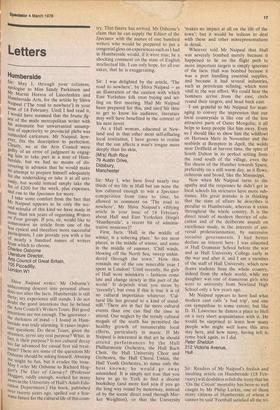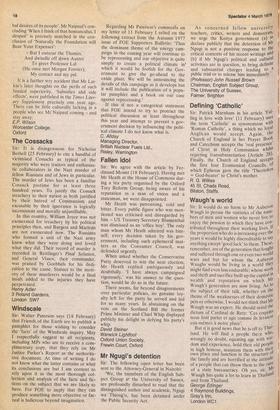Humberside
Sir: May I, through your columns, apologise to Miss Sandy Parkinson and Mr Martin Horrox of Lincolnshire and Humberside Arts, for the article by Shiva Naipaul ('The road to nowhere') in your issue of 18 February. Until I had read it, I Would have assumed that the brutta figura of the snide metropolitan writer with his automatic but unwarranted assumption of superiority to provincial plebs was tuirmoded caricature. Mr Naipaul, however, fits the description to perfection. Clearly, we at the Arts Council were Piny of an error of judgment in engaging him to take part in a tour of Humberside, but we had no means of discovering in advanbe that he would make Ito attempt to prepare himself adequately for the undertaking or take it at all seri°, usly, but would instead simply take the lee of £200 for the week, plus expenses, and run to the Spectator for more. I take some comfort from the fact that Mr Naipaul appears to be only the second mistake of this kind we have made in °lore than ten years of organising Writers on Tour groups. If you, sir, would like to commission an article from one of the less cynical and therefore more successful Participants, I can provide you with a list °f nearly a hundred names of writers frorn which to choose.
Charles Osborne Literature Director, Arts Council of Great Britain, ?OS Piccadilly, London W1
Shiva Naipaul writes: Mr Osborne's unbecoming descent into personal abuse cliOes not alter the facts. Humberside is still
there; m y experience still stands. I do not
doubt the good intentions that lie behind the Arts Council's Writers Tours. But good Intentions are not enough. The ignorance the darkness of mind I found in Humberside was truly alarming. It raises important questions. Do these Tours, given the situation, serve any real purpose? What, in fact, is thdir purpose? Is not cultural decay too far advanced for casual first aid treatMent? These are some of the questions Mr Osborne should be asking himself. Abusing ,.Itte might be fun, but it evades the issue. may I refer Mr Osborne to Richard Hog8art's The Uses of Literacy? (Professor lioggart, oddly enough, worked for many Years in the University of Hull's Adult Education Department.) His book, published over twenty years ago, spelled out a fearsome future for the cultural life of this coun try. That future has arrived. Mr Osborne's claim that he can supply the Editor of the Spectator with the names of one hundred writers who would be prepared to put a congenial gloss on experiences such as I had in Humberside would, if it were true, be a shocking comment on the state of English intellectual life. I can only hope, for all our sakes, that he is exaggerating.
Sir: I was delighted by the article, 'The road to nowhere', by Shiva Naipaul as an illustration of the caution with which East Yorkshire folk treat buying and selling on first meeting. Had Mr Naipaul been prepared for this, and used his time to get to know his audience, literature may well have benefited in the content of his next novel.
As a Hull woman, educated at Newland and in that other most self-effacing local institution, I have grown to realise that the sun Affects a man's tongue more deeply than his skin.
(Mrs) Ruth Rice 79 Austin Drive, Didsbury, Manchester Sir: May I, who have lived nearly two thirds of my life in Hull but am none the
less cultured enough to win a Spectator
competition from time to time, be allowed to comment on 'The road to nowhere', Mr Shiva Naipaul's vilifying article in your issue of 18 February about Hull and East Yorkshire (forget 'Humberside', a recent bit of administrative nonsense)?
First, facts. 'Hull, in the middle of winter, is a sobering place.' So are most places, in the middle of winter, and some in the middle of summer. 'Chill winds, blowing off the North Sea, sweep unhin
dered through the town.' How this reminds me of the one miserable year I spent in London! 'Until recently, the girls of Hull wore miniskirts fashions come late and change slowly in this part of the world.' It depends what you mean by 'recently'; but even if this is true it is of no cultural importance whatever. 'Cultural life has ground to a kind of stand-. still.' There are in fact far more cultural events than one can find the time to attend. Our neglect by the trendy cultural moguls of the south has permitted the healthy growth ofinnumerable local efforts, particularly in music. If Mr Naipaul is interested in that art he should attend performances by the Hull Philharmonic Orchestra, the Hull Bach Choir, the Hull University Choir and Orchestra, the Hull Choral Union, the Hull Youth Orchestra, to name only the best known; he ' would go away astonished. It is simply not true that you have to go to York to find a decent bookshop (and more fool you if you go the long way round by motorway, instead of by the scenic direct road through Market Weighton), or that the University
'makes no impact at all on the life of the town'; but it would be tedious to deal with these and other misrepresentations in detail.
Whoever told Mr Naipaul that Hull was severely bombed merely because it happened to lie on the flight path to more important targets is simply ignorant of the facts. Hull was bombed because it was a port handling essential supplies, and because it had several industries, such as petroleum refining, which were vital to the war effort. We could hear the bombers arrive from the east, circle round their targets, and head back east.
I am grateful to Mr Naipaul for managing to convey the impression that our local countryside is like one of the less attractive parts of Outer Mongolia; it all helps to keep people like him away. Even so I should like to show him the wildfowl on Hornsea Mere in November and the seabirds at Bempton in April, the wolds near Driffield at harvest time, the spire of South Dalton in its perfect setting from the road south of the village, even the flat shores of the Humber towards Spurn, preferably on a still warm day, as it flows, ochreous and broad, like the Mississippi.
Now when Mr Naipaul turns to the apathy and the responses he didn't get in local schools his strictures have more substance. His great mistake is in thinking that the state of affairs he describes is peculiar to Humberside, whereas it exists throughout the whole country. It is the direct result of modern theories of education and of the deliberate assault on excellence made, in the interests of universal proletarianisation, by successive socialist governments. I had better declare an interest here: I was educated at Hull Grammar School before the war and at Hull University College early in the war and after it, and I am a member of the staff of Hull University, which now draws students from the whole country, indeed from the whole world; while my daughter was one of numerous girls who went to university from Newland High School only a few years ago.
Mr Naipaul appears to have had what modern cant calls 'a bad trip', and one can sympathise to some extent; but like D. H. Lawrence he damns a place to Hell on a very short acquaintance with it. He would be surprised to learn how many people who might well leave this area stay here, and how many, having left it, come back again, as I did.
Peter Sheldon 212 Victoria Avenue, Hull Sir: Readers of Mr Naipaul's foolish and insulting article on Humberside (18 February) will doubtless relish the irony that his 'On the Circuit' mentality has been so well caught by Mr Philip Larkin, one of those many citizens of Humberside of whom it cannot be said 'Football satisfied all the tri bal desires of its people'. Mr Naipaul's concluding 'When I think of that homunculus, I despair' is precisely matched in the conclusion of 'Naturally the Foundation will Bear Your Expenses':
— But I outsoar the Thames, And dwindle off down Auster To greet Professor Lal (He once met Morgan Forster), My contact and my pal.
It is a further wry accident that Mr Larkin's later thoughts on the perils of such funded superiority, 'Subsidies ahd side effects', were published in the Times Literary Supplement precisely one year ago. There can be little culturally lacking in a people who see Mr' Naipaul coming — and stay away, E.P. Wilson Worcester College,
Oxford



































 Previous page
Previous page